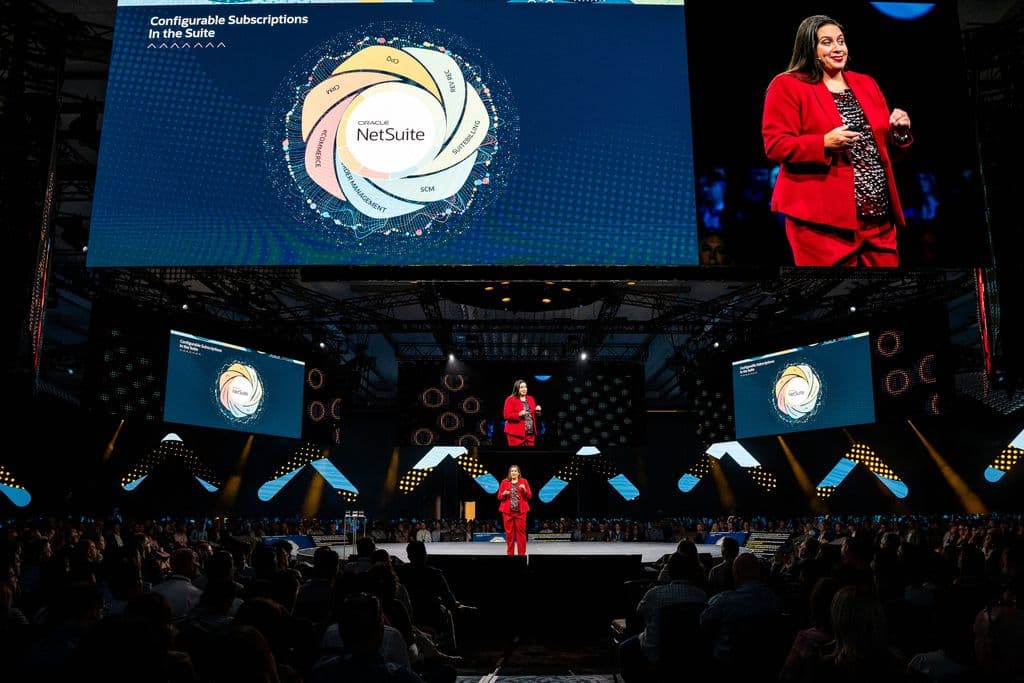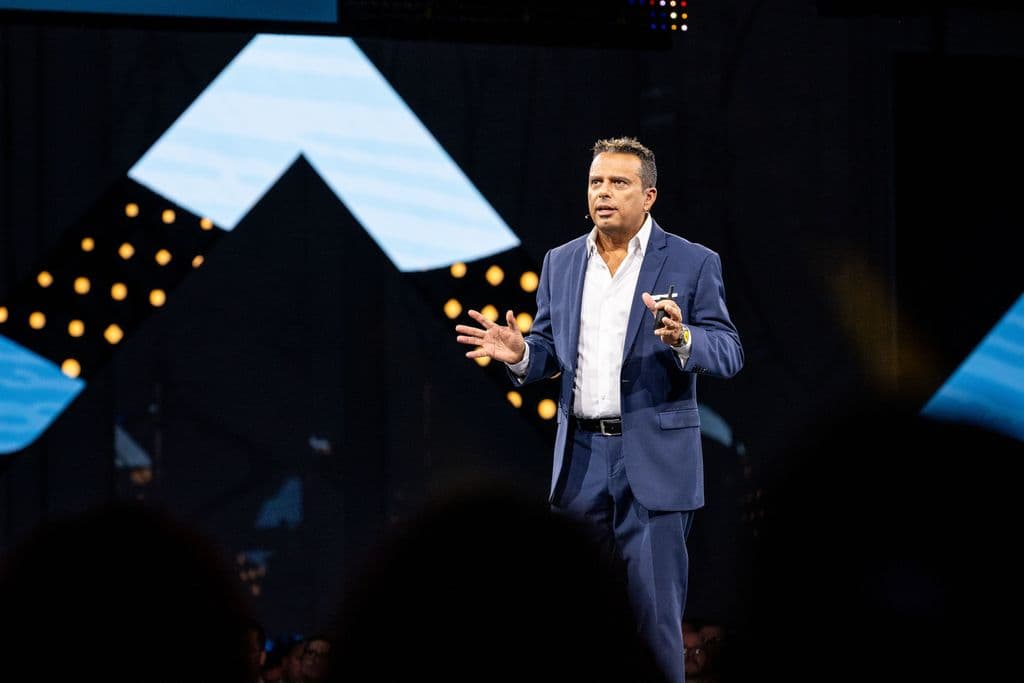NetSuite was built on the idea that fast-growing companies would benefit from running their entire business in a single system that connects processes and data across functions. 25 years later, this big idea is now summed up in a single word—“Suiteness”—that was at the heart of the company’s newest products announcements in a keynote October 18 at SuiteWorld 2023.
Today’s wave of artificial intelligence (AI) innovation only makes Suiteness more relevant and powerful. In his keynote, Gary Wiessinger, SVP of NetSuite application development, mapped out how the NetSuite approach will help companies apply AI to their own data from across their operations.
“NetSuite has the data for your whole business, not just one department,” Wiessinger said. “Not only data but insight. NetSuite understands what that data actually represents for your business in the relationships across your business. So with that data, and insight about your whole business, NetSuite can leverage AI in more powerful ways than point solutions can.”
While AI is already baked into many NetSuite modules and features, Wiessinger said his team is looking for ways it can be used across the suite “more and faster than ever before.” As evidence, there are 80 NetSuite AI-supported features that are either in production, development, or planning.
The goal of these improvements is to make it as simple as possible for businesses to unlock the actionable insights they need to address current challenges and proactively highlight future issues not yet on their radar, Wiessinger said.
The keynote showed how innovative NetSuite features—some in place, some in development—will help people make better decisions throughout a company’s core value streams.
Boosting the customer experience
Technology has heightened customer expectations, and Group Vice President of Product Management Allison Auclair showed how in the future various NetSuite tools on the front and back end could work hand-in-hand to help sellers meet them. In a demo, a customer answers a few questions, and an engine powered by NetSuite Configure, Price, and Quote (CPQ) identifies the product and related services that best fit their needs. The customer adds those selections to their cart but doesn’t finalize the purchase.
On the back end, a sales rep would then visit the NetSuite Customer 360 record for that potential customer, and the record could include an AI-generated headline and summary of key insights on the shopper’s behavior. NetSuite could then automatically create a quote based on the options the customer suggested, and the rep could apply the suggested discount based on that customer’s profitability. The system could then use AI to draft an email to the customer with the new quote, setting them up to close the business.
“This process allowed us to sell deals with products, services, and subscriptions altogether, across online and offline,” Auclair said. “Infused with AI plus Suiteness, SuiteCommerce, CRM, CPQ, and SuiteBilling are working together in harmony to create a truly differentiated experience.”

Auclair also showcased the newly available NetSuite Field Service Management application. When notified of a customer needing a repair or similar field service, a manager in the office can first create a service order in NetSuite, then view a schedule to see what qualified technicians are available and their current location. The field worker then receives a notification on their phone and can open the mobile app to review the project details, location, and history. They can select the products needed for the job, which are automatically deducted from available inventory in NetSuite.
Automating payroll and simplifying scheduling
Labor shortages have been one of the most persistent and impactful business challenges over the last few years. Pair that trend with a report this year from the Bureau of Labor Statistics that year-over-year productivity fell at the fastest rate in 75 years. The result: companies are looking for ways to do more with fewer workers.
Hanif Ismail, VP of strategy and product management for NetSuite HCM, shared a vision for one day moving to near-autonomous payroll. He showed a work-in-progress autonomous payroll assistant that could know when a company runs payroll and alerts managers of anomalies that require their review. Once those are resolved, the assistant can confirm sufficient funds are available in the account, run payroll, and provide a quick summary.
“Quick, simple, and intelligent—this is the future of payroll,” Ismail said.
Right now, NetSuite provides intelligent insights into payroll based on schedules. Ismail showed how NetSuite SuitePeople Workforce Management can highlight overtime when managers view the upcoming schedule so they can reassign shifts based on who’s available and what’s most cost-effective. If there’s a staffing shortage, a manager can create an unassigned shift that triggers a notification to employees, who can quickly accept it from their phones.

Recommendations to manage your cash better
Financials remain at the heart of NetSuite, and cash management is a big piece of that—especially today amid high interest rates and tight financial capital. Companies already have access to tools that help them manage and project cash flow, but NetSuite plans in upcoming versions to provide recommendations to help mitigate potential cash shortages. For example, Group Vice President of Product Management Craig Sullivan highlighted how the system might suggest taking advantage of longer payment terms that an existing vendor already offers, or selling your receivables through NetSuite Capital. The finance team could choose that action directly from the recommendation screen and the projection updates to reflect it.
“By bringing these concepts of experience, intelligence, and Suiteness together, NetSuite [can] help you to reduce the amount of time you spend on validating the numbers and help you achieve that dream state of spending more time serving the business with timely analysis and insight,” Sullivan said.
A few other notable announcements and nuggets from the product keynote
- NetSuite plans soon to have editions with functionality, roles, and dashboards tailored to three additional industries: healthcare, restaurants, and hospitality. The healthcare edition is expected to include a compliance-focused dashboard, given the sensitivity of patient information.
- 90% of NetSuite customers are now running on Oracle Cloud Infrastructure (OCI), and all are expected to be on it within the next 12 months.
- Customers can benefit from even faster, more reliable service once NetSuite is also running on Oracle Autonomous Database. The current plan projects all NetSuite customers will run on that by the end of 2024.
- As NetSuite adds more generative AI capabilities, NetSuite Prompt Studio will be designed to let administrators provide guidance and set templates that can help improve the quality of responses.
- NetSuite’s 37,000 customers collectively have 10 petabytes of data in NetSuite and run 1 trillion searches daily.
- NetSuite SuiteSuccess editions for Spain are now available.
Watch the full keynote with Gary Wiessinger and other NetSuite product leaders below.




